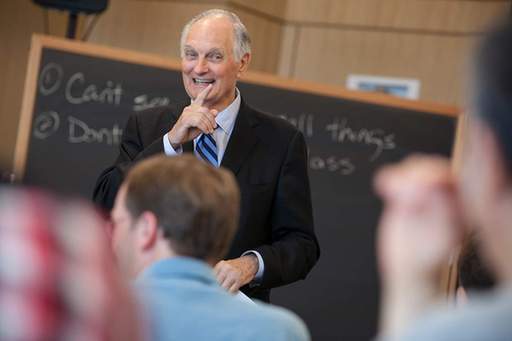當前位置: Language Tips> 英語學習專欄
分享到

My Favorite Liar
說假話的老師
By Kai Peter Chang 安然 選 盧青亮譯
One of my favorite professors in college was a self-confessed liar.
I guess that statement requires a bit of explanation.
The topic of Corporate Finance/Capital Markets is, even within the world of the Dismal Science, (Economics) an exceptionally dry and boring subject matter, encumbered by complex mathematic models and obscure economic theory.[1]
What made Dr. K memorable was a gimmick[2] he employed that began with his introduction at the beginning of his first class:
"Now I know some of you have already heard of me, but for the benefit of those who are unfamiliar, let me explain how I teach. Between today until the class right before finals, it is my intention to work into each of my lectures…one lie. Your job, as students, among other things, is to try and catch me in the Lie of the Day."
And thus began our ten-week course.
This was an insidiously[3] brilliant technique to focus our attention—by offering an open invitation for students to challenge his statements, he transmitted lessons that lasted far beyond the immediate subject matter and taught us to constantly check new statements and claims with what we already accept as fact.
Early in the quarter, the Lie of the Day was usually obvious—immediately triggering a forest of raised hands to challenge the falsehood. Dr. K would smile, draw a line through that section of the board, and utter his trademark phrase "Very good! In fact, the opposite is true. Moving on..."
As the quarter progressed, the Lie of the Day became more subtle, and many ended up slipping past a majority of the students unnoticed until a particularly alert person stopped the lecture to flag the disinformation.
Every once in a while, a lecture would end withnobody catching the lie which created its own unique classroom experience—in any other college lecture, end of the class hour prompts a swift rush of feet and zipping up of bookbags as students make a beeline for the door.
On the days when nobody caught the lie, we all sat in silence, looking at each other as Dr. K, looking quite pleased with himself, said with a sly grin: "Ah ha! Each of you has one falsehood in your lecture notes. Discuss amongst yourselves what it might be, and I will tell you next Monday. That is all."
Those lectures forced us to puzzle things out[4], work out various angles in study groups so we could approach him with our theories the following week.
Brilliant...but what made Dr. K's technique most insidiously evil and genius was, during the most technically difficult lecture of the entire quarter, there was no lie. At the end of the lecture in which he was not called on any lie, he offered the same challenge to work through the notes; on the following Monday, he fielded[5] our theories for what the falsehood might be (and shooting them down "no, in fact that is true—look at [x]") for almost ten minutes before he finally revealed: "Do you remember the first lecture—how I said that 'every lecture has a lie?'"
Exhausted from having our best theories shot down, we nodded.
"Well—THAT was a lie. My previous lecture was completely on the level[6]. But I am glad you reviewed your notes rigorously this weekend—a lot of it will be on the final. Moving on…” Which prompted an arousing melange of exasperated groans and laughter from the classroom.[7]
And while my knowledge of the Economics of Capital Markets has faded in time, the lessons that stayed with me were his real legacy:
"Experts" can be wrong, and say things that sound right—so build a habit of evaluating new information and check it against things you already accept as fact.
If you see something wrong, take the initiative to[8] flag it as misinformation.
A sense of playfulness is the best defense against taking yourself too seriously.
I've had many instructors before and since, but few that I remember with as much fondness—and why my favorite professor was a chronic[9] liar.
Vocabulary
1. the Dismal Science: “沉悶科學”,即經濟學,由19世紀歷史學家托馬斯·卡萊爾創造的一個貶義的替代名稱;encumber: 阻礙,拖累。
2. gimmick: 花招,把戲。
3. insidiously: 暗中為害地。
4. puzzle out: 苦苦思索而弄清楚。
5. field: v. 圓滿地答復,巧妙地回答。
6. on the level: 誠實的,可靠的。
7. melange: 混合物;exasperated: 惱怒的;groan: 呻吟。
8. take the initiative to do: 積極主動地去做。
9. chronic: 積習難改的,有癮的。
上一篇 : “希臘生活”席卷美國校園
下一篇 :
分享到
關注和訂閱


電話:8610-84883645
傳真:8610-84883500
Email: languagetips@chinadaily.com.cn